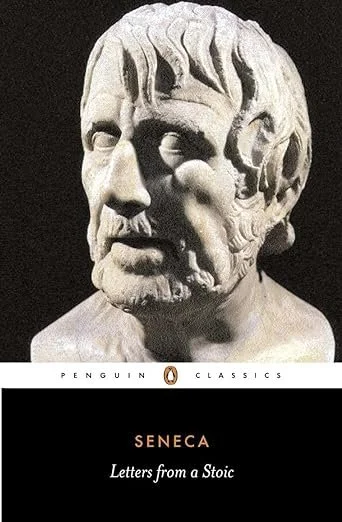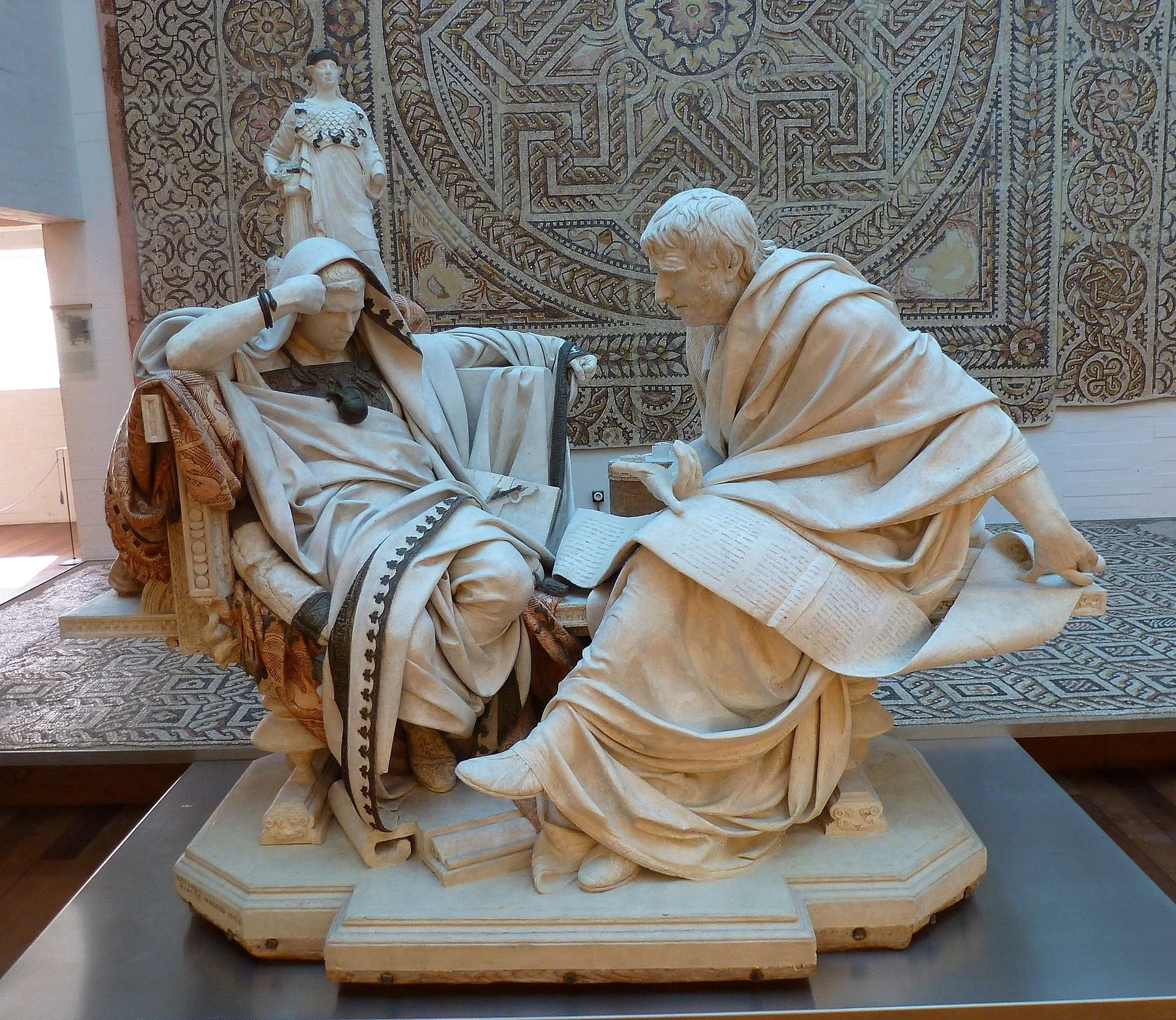Seneca’s 20 Stoic Principles for Lasting Wisdom & a Resilient Mindset
Key Insights from Seneca’s 'Letters from a Stoic' for Personal Growth and Wisdom
Reading time: 9 minutes
My first recollection of Seneca dates back to my high school philosophy class. Fast forward nearly two decades, and while the specific content has faded from memory, what remains vivid is my philosophy teacher's smile whenever Seneca was mentioned or quoted.
While philosophy was once among my favorite high school classes, it faded into the background in the subsequent years. The demands of university, initial jobs, and the overall process of navigating adulthood proved to be distracting. Only in the past three years have I felt a strong desire to revisit the realm of philosophical wisdom and see what it has to say about the many questions in life.
Seneca, a prominent Stoic philosopher and statesman of the first century AD, shaped ethical thought and personal development. As a leading figure among the Stoics, Seneca's influence shaped not only philosophy but also ethics and personal development. His significance lies in his practical and accessible approach to Stoicism, which emphasized the pursuit of virtue, resilience in the face of adversity, and the cultivation of wisdom for a flourishing life.
In today’s post, we provide 20 powerful Stoic lessons from Seneca to help you find clarity, peace, and purpose in a chaotic, modern world. These are extracted from Seneca’s “Letters from a Stoic” (Penguin Classics). These ideas supplement a previous post on Stoicism more broadly, where we provided 25 Stoic actions and ideas that can enable us to discover a more joyous life and to experience less negative emotions in our day-to-day.
*Affiliate link: If you enjoy our content, consider purchasing your book through our link. We earn a small commission, which helps support the blog.
20 Takeaways and Quotes for leading a meaningful life
1. The Importance of Solitude for Mental Well-being
“Nothing (…) is better proof of a well ordered mind than a man’s ability to stop just where he is and pass some time in his own company”. Seneca advocates for self-reflection, inner peace, contentment, and mental clarity for a balanced life. Being comfortable alone signifies mental well-being, self-sufficiency, and emotional resilience, core pillars of Stoicism. It aligns with Stoic philosophy, which often emphasizes the importance of cultivating inner strength and tranquility regardless of external circumstances.
2. Finding Contentment in Simplicity and Enough
“You ask what the proper limit to wealth? First, having what is essential, and second, having what is enough”. It is not the man who has too little who is poor, but the man who is always after more. If your focus in life is to gather possessions and riches, you will never be truly satisfied, you will always look over your shoulder to those who have more. Focus on gratitude for what you already possess, fostering contentment and inner peace.
3. Managing Hope and Fear to Achieve Inner Peace
“Cease to hope and you will cease to fear”. Seneca suggests that hope and fear are deeply connected emotions that impact mental peace and clarity. When you hope for something, you also introduce the possibility of fear–fear of not attaining what you hope for or fear of losing it once you have attained it. Seneca is not advocating for a life without goals or aspirations, but emphasizing the Stoic idea of cultivating inner resilience and tranquility by moderating one's desires and attachments. If you can reduce your attachment to specific outcomes or desires, you are less likely to experience fear associated with the uncertainty of achieving those outcomes.
4. The Joy of Learning and Teaching as Social Beings
“Part of my joy in learning is that it puts me in a position to teach”. Stoics recommend that we live “in accordance with nature”, which is expressing ourselves as both rational and social creatures. Seneca advocates for the pursuit of knowledge not for its own sake, but to benefit others, fulfilling Stoic ideals of wisdom and service. In learning and teaching, we satisfy both our rational and social dimensions.
5. Surround Yourself with Virtuous People for Growth
“Associate yourself with people who are likely to improve you”. The Stoics encourage us to surround ourselves with virtuous individuals to accelerate moral and personal growth. Choosing positive influences in one's social circle will enable cultivating virtues like wisdom and justice. This concept reflects the Stoic emphasis on self-improvement and the impact of our acquaintances on our character.
6. Disciplining the Body for Mental Clarity and Virtue
“Indulge the body just so far as suffices for good health. It needs to be treated somewhat strictly to prevent it from being disobedient to the spirit”. Stoics advised moderate care for the body to maintain good health without excess and emphasized discipline to prevent the body from obstructing the pursuit of virtue. An undisciplined body hinders the path to virtue and mental clarity, a core principle of Stoicism by fostering distractions, undermining self-discipline, and promoting behaviors that are contrary to the principles of reason and moral excellence.
Seneca committing suicide with his foot in a bath. Coloured engraving by B. Ravenet after R. Earlom after Luca Giordano. Retrieved from Wikipedia.
* Further Reading – Article continues below *
7. A Happy Life Comes from Within, Not External Aids
“The supreme ideal”–a happy life–“does not call for any external aids”. Seneca points out that this ideal is “homegrown”, and that once you start looking outside of yourself for sources of contentment and meaning, you are on the way to be dominated by chance. What matters are the qualities of a just, good, and enlightened character–which are full within our control–and to not regard as valuable anything that is capable of being taken away.
8. Practicing Voluntary Poverty to Build Resilience
“Any man who does not think what he has is more than ample, is an unhappy man, even if he is the master of the world”. Here Seneca is quoting Epicurus, the leader of a rival philosophical school. Seneca encourages practicing voluntary poverty through acts of self-denial to cultivate resilience and contentment (e.g., experiencing hunger, thirst, cold), since “we shall be easier in our minds when rich if we have come to realize how far from burdensome it is to be poor”.
9. Choose a Role Model to Inspire Virtuous Living
“Choose yourself a Cato (…) Choose yourself someone whose way of life as well as words have won your approval”. Seneca recommends that we go about our day keeping our role model (or models) constantly before our eyes, and that we live as if he or she were watching out for each and every one of our moves. Cato exemplified unwavering moral rectitude in his commitments to Stoic principles, embodying virtues such as courage, integrity, and resilience.
10. Embrace Memento Mori to Fully Appreciate Life
“If God adds the morrow we should accept it joyfully”… “Whoever says ‘I have lived’ receives a windfall every day when he gets up in the morning”. The Stoics urge us to regularly contemplate mortality, a practice known as 'memento mori,' to embrace life fully, that we should live each day of our lives as it were the last. Living in this way allows us to appreciate every moment. Any day that comes thereafter is “extra”.
11. Embrace Truth from Others to Foster Openness
“Whatever is true is my property”. Here, Seneca is again quoting Epicurus, a philosophical rival. It is a reminder that embracing ideas from others fosters intellectual growth and cultivates openness, a core Stoic value. After all, “whatever is well said by anyone belongs to me”.
12. Wealth and Fame Will Never Lead to True Contentment
“Say goodbye at last to those deceptive prizes more precious to those who hope for them than those who have won them”. In line with other Stoics, Seneca cautions that the pursuit of wealth and fame leads to dissatisfaction, urging us to seek inner contentment instead; we will never feel contentment and it will always leave us reaching for more: these pursuits “simply aggravate the thirst of those who swallow them”.
13. Understanding Natural Desires for Greater Peace
“Nature’s wants are small, while those of opinion are limitless”. Seneca is reflecting here again on Epicurus, who stated that “if you shape your life according to nature, you will never be poor; if according to people’s opinions, you will never be rich”. When you want to know whether the desire aroused in you is natural or not, consider whether it is capable of coming to rest at any point; if the goal posts keep moving away, it is likely an unnatural desire.
Nero and Seneca, by Eduardo Barrón (1904). Museo del Prado. Retrieved from Wikipedia.
14. Rehearsing Death as a Path to Ultimate Freedom
“Rehearse death. To say this is to tell a person to rehearse his freedom. A person who has leaned to die has unlearned how to be a slave”. Seneca urges us to embrace death as inevitable, a Stoic exercise to achieve ultimate freedom from fear, and suggests that by doing so we are preparing ourselves for true freedom, since we liberate ourselves from the mental handcuffs of fear and servitude.
15. True Fulfillment Comes from Inner Transformation
“How can you wonder your travels do you no good, when you carry yourself around with you?” Here, Seneca is quoting Socrates. Seneca emphasizes that true fulfillment comes from inner transformation, not external changes. Ultimately, we cannot expect external circumstances to solve our internal problems. This focus on the inner life echoes a timeless search for meaning—one that different eras and philosophies have answered in radically different ways.
Once you have rid yourself of the internal affliction, though, any change of scenery will be a pleasure, even if you are “banished to the ends of the earth”. “Where you arrive does not matter so much as what sort of person you are when you arrive there”. “If you want to enjoy your travel, you must make your ‘traveling companion’ a healthy one”.
16. Living for Others as a Source of Meaningful Life
“You should live for the other person if you wish to live for yourself”. Here, we hear echoes of different spiritual traditions, including Christianity and Buddhism. As we saw in a previous post, the Dalai Lama advocated for a “wise selfishness”, since the ultimate source of a meaningful life lies within ourselves and having a greater sense of responsibility and concern for others.
17. Contemplating Death Brings Tranquility, Not Fear
“Death is just not being. What that is like I know already. It will be the same after me as it was before me”. Seneca says someone would be a fool to think a lamp was worse off when it was put than before it was lit. Although we suffer a bit in the intervening period–our lives–we should take comfort that at either end there is only deep tranquility. “Nothing is grim when we have escaped” the fear of death.
18. The Quality of Life is More Important Than Its Length
“As it is with a play, so it is with life–what matters is not how long the acting lasts, but how good it is”. Seneca advises us to lead an honourable life–to focus on the quality of one's actions and virtues–and to round it off with a courageous ending.
19. Living with Integrity and Accountability
“Live as if we were in public view”. We should adopt a mindset of integrity in both our actions and thoughts: Seneca advises that we live and think as if someone could glance into the depths of our hearts. It encourages us to cultivate a strong sense of morality and accountability.
20. Living Well is the Ultimate Gift of Philosophy
“Life is the gift of the immortal gods but living well is the gift of philosophy”. The nobility of wisdom lies in the realization that we are not born into a state of moral enlightenment; rather, each individual must strive for it through their own efforts. True richness lies in the pursuit of wisdom, and philosophy serves as the guiding beacon, enabling individuals to navigate the complexities of existence and forge a path toward moral excellence and tranquility.
Enjoyed this post? Don’t miss our post on 25 Stoic principles for leading a good life or 8 longevity tips from Netflix’s Blue Zones show.
🌿 Thanks for reading The Good Life Journey. I share weekly insights on money, purpose, and health, to help you build a life that compounds meaning over time. If this resonates, join readers from over 100 countries and subscribe to access our free FI tools and newsletter.
*Affiliate link: If you enjoy our content, consider purchasing your book through our link. We earn a small commission, which helps support the blog. In addition, 10% of all revenue generated is donated to charitable causes.
About the author:
Written by David, a former academic scientist with a PhD and over a decade of experience in data analysis, modeling, and market-based financial systems, including work related to carbon markets. I apply a research-driven, evidence-based approach to personal finance and FIRE, focusing on long-term investing, retirement planning, and financial decision-making under uncertainty.
This site documents my own journey toward financial independence, with related topics like work, health, and philosophy explored through a financial independence lens, as they influence saving, investing, and retirement planning decisions.
Check out other recent articles
Join readers from more than 100 countries, subscribe below!
Didn't Find What You Were After? Try Searching Here For Other Topics Or Articles:

































